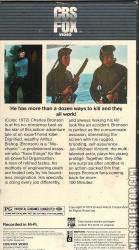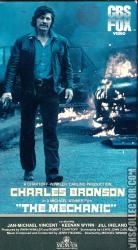The Mechanic
Catalog Number
4685
-
Primary Distributor (If not listed, select "OTHER")
Catalog Number
4685
Primary Distributor (If not listed, select "OTHER")
Release Year
Country
N/A (NTSC)
N/A | N/A | N/A
N/A | N/A
The Mechanic (1972)
Additional Information
Additional Information
Clean. Fast. Professional.
He has 100 ways to kill... and they all work!
He fixes people so they never work again.
Charles Bronson re-teams with director Michael Winner -- sandwiched between their first pairing in the underrated Chato's Land and their seminal collaboration in Death Wish -- in this Lewis John Carlino-scripted actioner. Bronson plays Arthur Bishop, a "mechanic" or hired killer, famed for his efficient and unfeeling contract executions. The young and eager Steve McKenna (Jan-Michael Vincent) teams up with him, hoping that Bishop will teach him the bounty-hunting business. Imparting words of wisdom to Steve like, "Murder is only killing without a license and everybody kills -- the Army, the police," the two undergo a series of adventures as Bishop shows Steve the ropes. Between action scenes, Bronson's wife Jill Ireland makes an appearance as a sexy hooker.
Vincent Canby of The New York Times described The Mechanic as a "solemn, rather spurious action melodrama". Noting the "father son rivalry" between Arthur and Steve and picking up on the "latent homosexual bond" between the two, Canby concluded that the film was "non-stop, mostly irrelevant physical spectacle" and pondered what a different director might have done with the same material.[5] Roger Ebert praised Bronson's performance, noting that he appears to be truly listening to Vincent rather than simply waiting for him to stop for Bronson's next line. While finding the plot twists "neat", Ebert found that director Winner failed to squarely address the relationship between the leads in favor of too many boring action sequences.[6] Judith Crist dismissed the film as "a banal expedition into slaughter and sadism and stupid dialogue". Any hint of authenticity, she wrote, was obliterated by Winner's "bang-bang-bang approach"
Release Date: November 16, 1972
Distrib: United Artists
He has 100 ways to kill... and they all work!
He fixes people so they never work again.
Charles Bronson re-teams with director Michael Winner -- sandwiched between their first pairing in the underrated Chato's Land and their seminal collaboration in Death Wish -- in this Lewis John Carlino-scripted actioner. Bronson plays Arthur Bishop, a "mechanic" or hired killer, famed for his efficient and unfeeling contract executions. The young and eager Steve McKenna (Jan-Michael Vincent) teams up with him, hoping that Bishop will teach him the bounty-hunting business. Imparting words of wisdom to Steve like, "Murder is only killing without a license and everybody kills -- the Army, the police," the two undergo a series of adventures as Bishop shows Steve the ropes. Between action scenes, Bronson's wife Jill Ireland makes an appearance as a sexy hooker.
Vincent Canby of The New York Times described The Mechanic as a "solemn, rather spurious action melodrama". Noting the "father son rivalry" between Arthur and Steve and picking up on the "latent homosexual bond" between the two, Canby concluded that the film was "non-stop, mostly irrelevant physical spectacle" and pondered what a different director might have done with the same material.[5] Roger Ebert praised Bronson's performance, noting that he appears to be truly listening to Vincent rather than simply waiting for him to stop for Bronson's next line. While finding the plot twists "neat", Ebert found that director Winner failed to squarely address the relationship between the leads in favor of too many boring action sequences.[6] Judith Crist dismissed the film as "a banal expedition into slaughter and sadism and stupid dialogue". Any hint of authenticity, she wrote, was obliterated by Winner's "bang-bang-bang approach"
Release Date: November 16, 1972
Distrib: United Artists
Related Links
Related Releases2
Catalog Number
M201259
Primary Distributor (If not listed, select "OTHER")
The Mechanic (1972)
Release Year
Catalog Number
M201259
Primary Distributor (If not listed, select "OTHER")
Catalog Number
M201259
Catalog Number
4685
Primary Distributor (If not listed, select "OTHER")
The Mechanic (1972)
Release Year
Catalog Number
4685
Primary Distributor (If not listed, select "OTHER")
Catalog Number
4685












Comments0
Login / Register to post comments